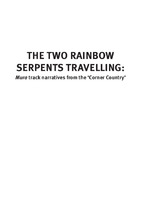The Two Rainbow Serpents travelling: Mura track narratives from the 'Corner Country'
Author(s)
Beckett, Jeremy
Hercus, Luise
Language
EnglishAbstract
The ‘Corner Country’, where Queensland, South Australia and New South Wales now converge, was in Aboriginal tradition crisscrossed by the tracks of the mura, ancestral beings, who named the country as they travelled, linking place to language. Reproduced here is the story of the two Ngatyi, Rainbow Serpents, who travelled from the Paroo to the Flinders Ranges and back as far as Yancannia Creek, where their deep underground channels linked them back to the Paroo. Jeremy Beckett recorded these stories from George Dutton and Alf Barlow in 1957. Luise Hercus, who has worked on the languages in the area for many years, has collaborated with Jeremy Beckett to analyse the names and identify the places.
Keywords
aboriginal australians; rainbow serpents; religion; Diyari language; Flinders Ranges; George Dutton; Malyangapa; Paakantyi; Paakantyi (Darling language); Snake; Wilson River language; Yancannia StationDOI
10.26530/OAPEN_459747OCN
423345289Publisher
ANU PressPublisher website
https://press.anu.edu.au/Publication date and place
Canberra, 2009Classification
Religion and beliefs


 Download
Download Web Shop
Web Shop